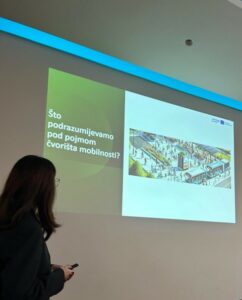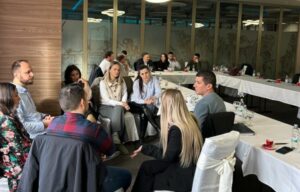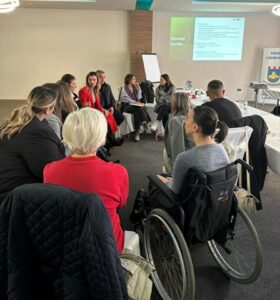 A participatory workshop with the citizens was held on Wednesday, December 11th, 2024, in Hotel Bigeste in the City of Ljubuški in the frame of GREENMO project- Promoting Green and Inclusive Mobility hubs for greener MED living areas by leveraging citizens’ real needs.
A participatory workshop with the citizens was held on Wednesday, December 11th, 2024, in Hotel Bigeste in the City of Ljubuški in the frame of GREENMO project- Promoting Green and Inclusive Mobility hubs for greener MED living areas by leveraging citizens’ real needs.
The objective of this workshop was to gather citizens’ opinions, perceptions, and suggestions about the potential development of mobility hubs in the city area. The workshop was initiated by the moderator, who provided a concise overview of the project, explaining key concepts and emphasizing the importance of mobility hubs for improving transport infrastructure and quality of life. Following the introductory remarks, the participants proceeded to introduce themselves, detailing their daily commuting routines. The responses varied depending on the participants’ respective locations. Some individuals reported commuting by foot for a duration of 15 minutes, while others noted short car rides of commuting of 5 to 10 minutes. A significant number of participants also noted that they frequently engage in walking during their leisure time.

The concept of mobility hubs was explicitly explained, outlining their fundamental components and expounding the distinctions between urban, suburban, and rural hubs. Subsequent to this presentation, the participants were divided into three groups, each focused on a distinct type of mobility hub. These groups then engaged in collaborative efforts to complete assigned tasks.
In accordance with the design thinking method, participants were jointly engaged to explore the potential benefits of mobility hubs and to formulate concepts for their ideal hub. The moderator facilitated the collection of input from each group, and subsequently, representatives from these groups presented in plenary the traffic problems they face on a daily basis, along with the challenges and ideas related to establishing an ideal mobility hub.
- The urban mobility hub group placed particular emphasis on the necessity of a compact hub situated at the city’s entrance, incorporating electric buses, e-scooters, and a park-and-ride system. The group’s proposal encompassed additional features, including free Wi-Fi, charging stations for electric vehicles, green spaces, and real-time digital information on transport availability.
- The suburban mobility hub group focused on intermodal connectivity through park-and-ride systems, accompanied by ample parking provisions for both cars and bicycles. They underscored the importance of establishing connections between suburban regions and urban centers through minibuses or e-scooters, emphasizing the incorporation of charging kiosks and information systems to facilitate citizens’ navigation.
- In contrast, the rural mobility hub group expressed skepticism regarding the necessity for a hub, underscoring that the dispersed nature of settlements and the prevailing reliance on private vehicles may make such a hub impractical. They proposed that financial resources be reallocated toward the enhancement of fundamental infrastructure, such as sidewalks and bicycle lanes, while the implementation of bus routes could facilitate connectivity between rural areas and urban centers.

The workshop proceeded with an exploration of citizens’ perceptions and needs regarding mobility hubs as well as a series of scenario exercises. Participants shared their thoughts on how hubs might impact their daily travel habits and quality of life. More specifically, the urban mobility hub group placed particular emphasis on the necessity of reducing congestion and enhancing the integration of diverse transportation modalities that would provide more options to the citizens. The suburban mobility hub group emphasized connecting the first and last mile of travel through park-and-ride systems, while the rural mobility hub group reiterated that existing conditions do not justify investing in such a system but rather funding of basic infrastructure should precede the consideration of hub construction.
Summing up, the workshop was conducted successfully in Ljubuski, with citizens actively participating and sharing their opinions, perceptions, and suggestions about mobility hubs. While acknowledging the potential for enhancement, the primary challenge identified lies in changing attitudes and daily routines of individuals with a pronounced reliance on cars, even for short distances. The development of transport solutions that promote sustainable mobility and reduce car dependency is essential to address these challenges.


